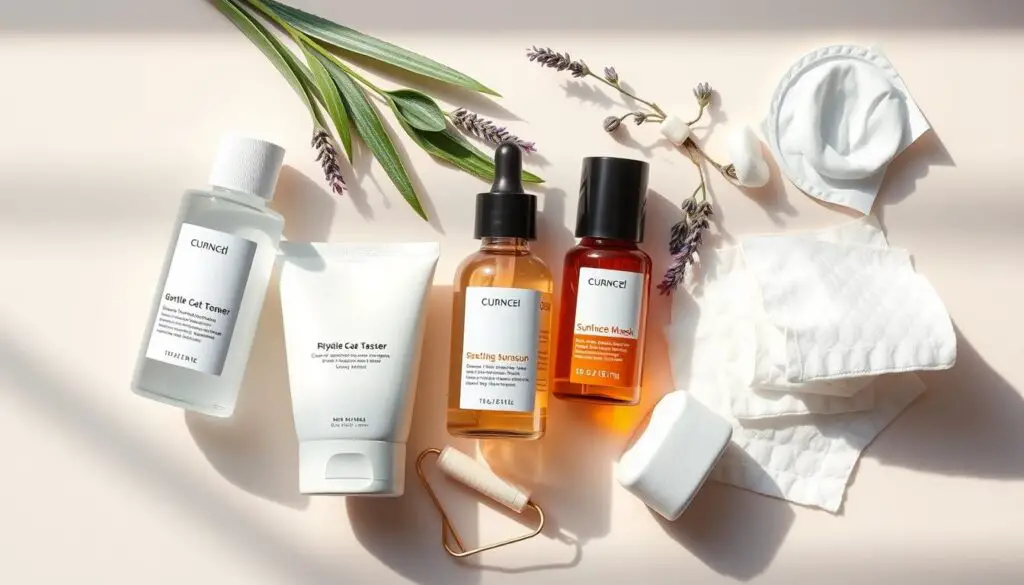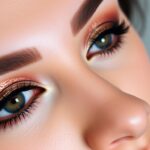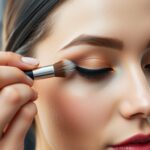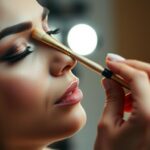Feeling overwhelmed by complex skincare routines? What if you could improve your skin in just 10 minutes a day?
Skincare doesn’t have to be hard. A simple routine can work wonders. Most people see great results with just a few steps that take under 10 minutes.
Starting your skincare journey is easy. Focus on three key steps: cleansing, moisturizing, and protecting. These tips can help you tackle common issues like dryness and dullness.
You don’t need a lot of products or hours to get ready. With a few key items and consistent use, you can see big improvements in your skin’s look and health.
Struggling with breakouts, dry skin, or just want to glow? A good skincare routine can help. Let’s explore the essential steps for a routine that fits your skin perfectly.
Table of Contents
Understanding Your Skin Type
Beginner Skincare Routine: Starting a simple skincare routine begins with knowing your skin type. Your skin is unique, and understanding it helps you choose the right products. This makes your skincare routine effective.
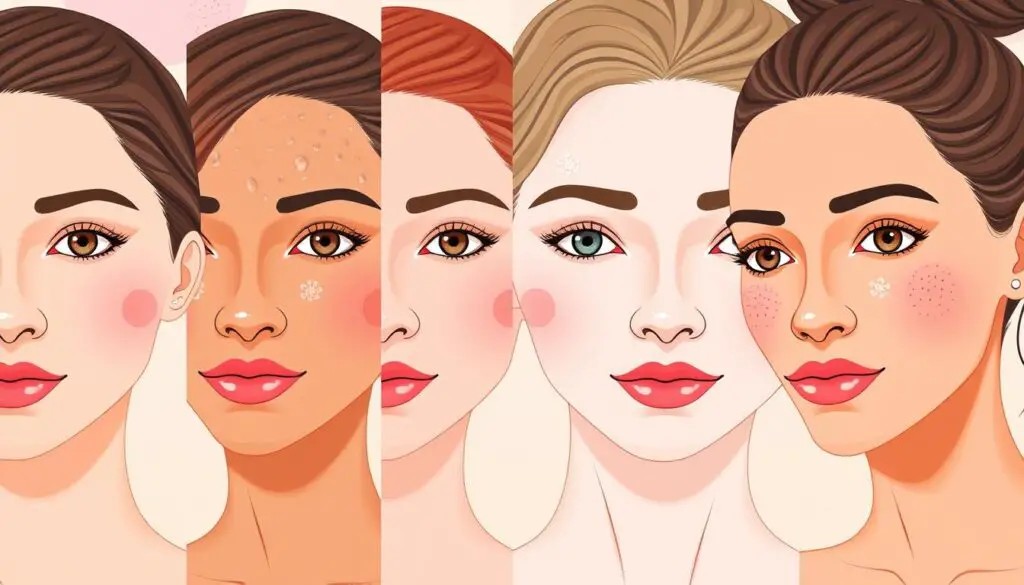
Knowing your skin type is more than just looks. It’s about how your skin reacts to the environment and products.
Importance of Knowing Your Skin Type
Knowing your skin type is key. It tells you:
- Which products will work best for you
- How your skin might react to different treatments
- The most effective skincare strategies
Common Skin Types Explained
Dermatologists identify five main skin types:
- Normal Skin: Balanced, with minimal concerns (50% of people)
- Oily Skin: Shiny appearance, especially in T-zone (30% of adults)
- Dry Skin: Feels tight, may have flaky patches (20% of individuals)
- Combination Skin: Mixed characteristics in different facial areas (40% of people)
- Sensitive Skin: Prone to redness and irritation (50% report sensitivity)
How to Determine Your Skin Type
“Know your skin, know your glow” – Skincare Experts
To find your skin type, do a simple test at home. Cleanse your face, wait an hour, and see how it feels:
- Tight and uncomfortable? Likely dry skin
- Shiny all over? Probably oily skin
- Oily in some areas, dry in others? Combination skin
- No significant changes? You might have normal skin
Remember, your skin type can change with age, climate, and hormones. Regularly checking your skin helps keep your routine effective.
Essential Skincare Ingredients
Beginner Skincare Routine:Starting your skincare journey can feel overwhelming. This guide will help you understand the basics of skincare ingredients. Choosing the right ones is key to healthy, glowing skin.
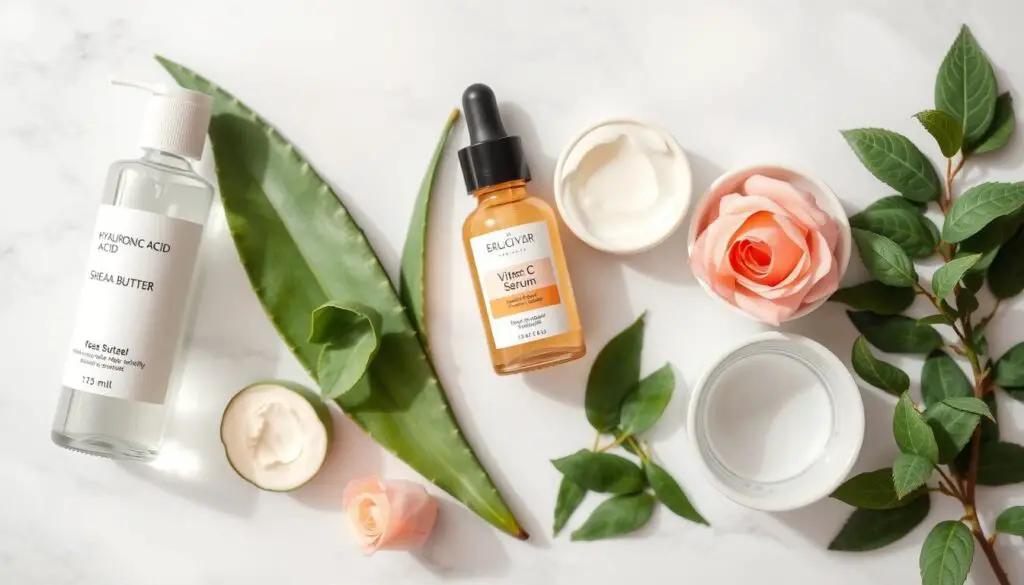
Key Ingredients for Healthy Skin
Beginner Skincare Routine: For beginners, knowing the essential ingredients is crucial. Your skin needs specific nutrients for a healthy glow. Here are the top ingredients to look for:
- Hyaluronic Acid: Provides intense hydration and plumps skin
- Peptides: Supports collagen production and reduces fine lines
- Vitamin C: Brightens skin and fights free radical damage
- Niacinamide: Helps control oil and minimize pores
Benefits of Natural Ingredients
“Your skin is a reflection of what you put into and onto your body.” – Skincare Expert
Natural ingredients are powerful and gentle. Discover natural skincare solutions that work with your skin’s natural processes.
| Natural Ingredient | Skin Benefits |
|---|---|
| Aloe Vera | Soothes inflammation, hydrates skin |
| Green Tea Extract | Fights aging, reduces redness |
| Jojoba Oil | Balances oil production, moisturizes |
What to Avoid in Skincare Products
Not all ingredients are good for your skin. Be careful of these potential irritants:
- Alcohol-based products
- Synthetic fragrances
- Parabens
- Sulfates
Remember, 50% of skincare users focus on specific ingredients. Your skin needs careful, informed care that meets its unique needs.
Step 1: Cleansing Your Face
Beginner Skincare Routine: Learning to cleanse your face is key in any quick skincare guide. Your essential skincare routine starts with knowing how to clean your face right. Cleansing gets rid of dirt, makeup, and other stuff that builds up all day.

How to Choose the Right Cleanser
Finding the perfect cleanser is all about your skin type. Here are some tips:
- Sensitive skin: Go for fragrance-free, gentle formulas
- Oily skin: Try gel or foam cleansers with salicylic acid
- Dry skin: Opt for cream-based or hydrating cleansers
- Combination skin: Use balanced, mild cleansing products
The Proper Cleansing Technique
Here’s how to clean your face effectively:
- Wash your hands before touching your face
- Use lukewarm water to avoid skin irritation
- Apply cleanser with gentle circular motions
- Rinse well with clean water
- Pat dry with a clean towel
“Clean skin is the foundation of any successful skincare routine.”
Common Cleansing Mistakes to Avoid
Avoid these mistakes to protect your skin:
- Using water that’s too hot or cold
- Scrubbing skin too hard
- Skipping cleansing before bed
- Using harsh, alcohol-based products
Pro tip: Cleanse twice daily – morning and evening – to keep your skin healthy and radiant.
Step 2: Exfoliating Regularly
Beginner Skincare Routine: Exfoliation is a key part of any skincare routine for beginners. Our skin sheds dead cells naturally, but sometimes it needs a boost. A good exfoliation routine can make your skin look brighter and smoother.
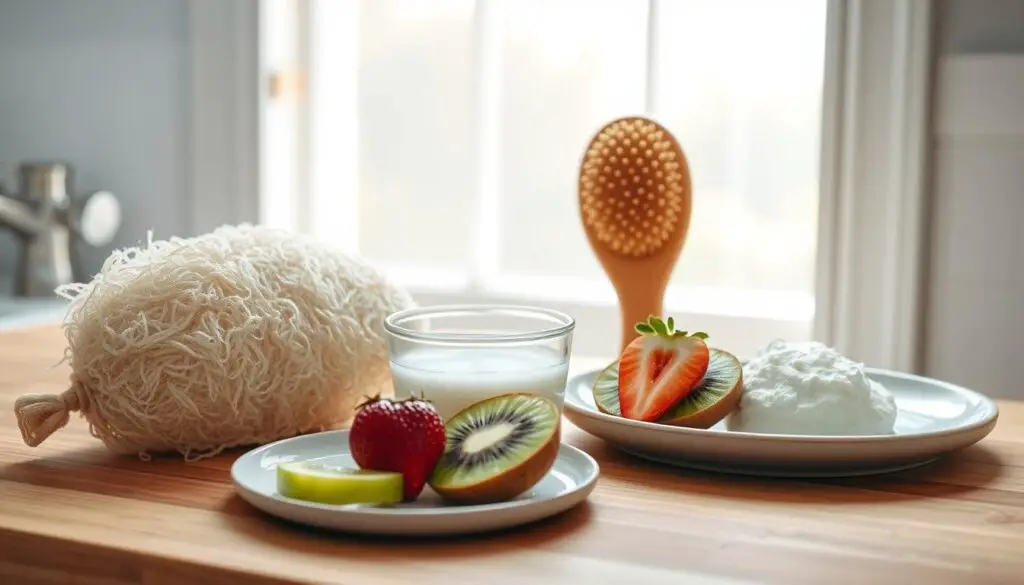
Why Exfoliation Matters
Exfoliating regularly has many benefits for your skin:
- Removes dead skin cells
- Unclogs blocked pores
- Enhances skin’s natural radiance
- Improves product absorption
Physical vs. Chemical Exfoliants
Knowing the difference between physical and chemical exfoliants is important. Physical exfoliants use small granules to scrub away dead skin. Chemical exfoliants use acids to break down skin cells.
| Exfoliant Type | Characteristics | Best For |
|---|---|---|
| Physical Exfoliants | Mechanical scrubbing | Oily, resilient skin |
| Chemical Exfoliants | Acid-based breakdown | Sensitive, acne-prone skin |
Exfoliation Frequency
For most beginners, exfoliating 1-2 times per week is best. Paula’s Choice exfoliating liquid, priced at $14, contains beta hydroxy acid (BHA). It has received tens of thousands of five-star reviews.
Pro tip: Listen to your skin and adjust frequency based on its response.
Remember, gentle exfoliation is key to maintaining a healthy skin barrier and achieving that coveted natural glow.
Step 3: Toning Your Skin
Beginner Skincare Routine: Starting a simple skincare routine is easier when you know the importance of toners. They’ve changed from harsh, alcohol-based products to gentle skin balancers. These help your skin soak up other products better.
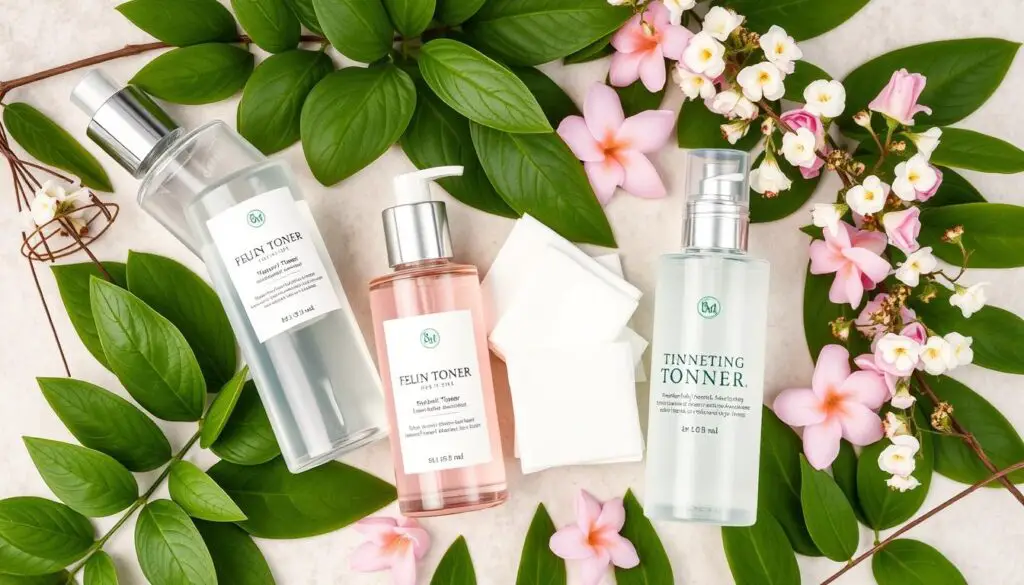
The Purpose of Toner in Your Routine
Beginner Skincare Routine: Today’s toners do more than just clean your skin. They help restore your skin’s natural pH, remove leftover makeup or cleanser, and add moisture. A good skincare routine sees toners as a key step between washing and moisturizing.
- Balances skin pH
- Removes remaining impurities
- Prepares skin for subsequent products
- Provides initial hydration
Choosing the Right Toner for Your Skin
Finding the right toner depends on your skin type and needs. Research shows 90% of users see better skin balance with the right toner.
| Skin Type | Recommended Toner Characteristics |
|---|---|
| Oily Skin | Alcohol-free, mattifying formulas |
| Dry Skin | Hydrating ingredients like hyaluronic acid |
| Sensitive Skin | Fragrance-free, calming ingredients |
Application Tips for Best Results
Technique matters when using toner. Pat it gently onto clean skin with clean hands or a soft cotton pad. This can boost product absorption by about 30%.
“Toning is not just an extra step – it’s a bridge between cleansing and moisturizing in your skincare journey.” – Skincare Expert
By adding these tips to your routine, toning becomes a key part of your skincare. It helps your skin stay healthy and glowing.
Step 4: Applying a Moisturizer
Moisturizing is key in any skincare routine. It’s important to know how to hydrate your skin well. This can change how you care for your skin.
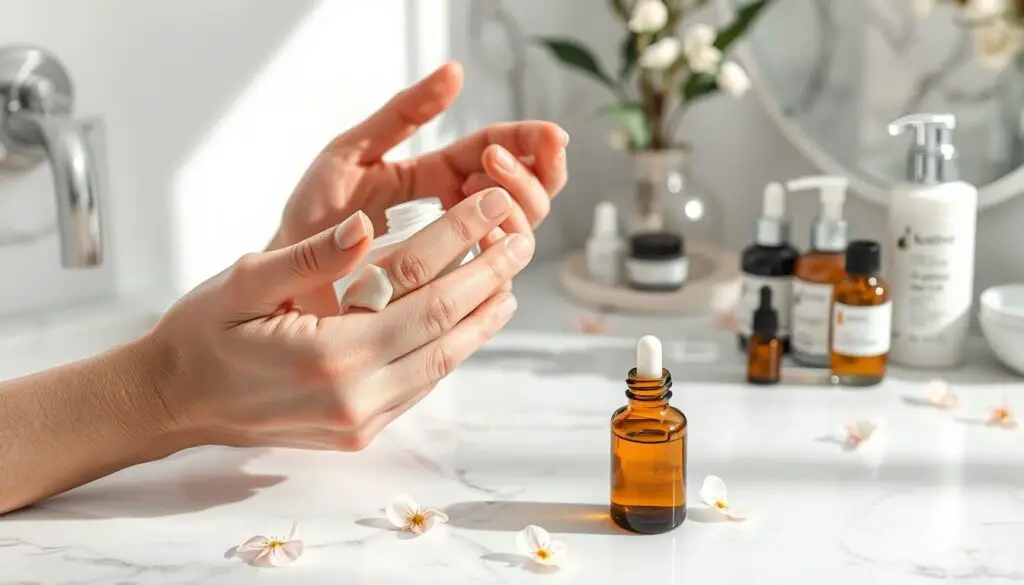
Finding the right moisturizer can seem hard, but it’s not. Your skin type needs a specific moisturizer. Experts say to know your skin type.
Finding Your Perfect Moisturizer
- Normal skin: Light, balanced moisturizers
- Dry skin: Rich, cream-based hydrators
- Oily skin: Gel or water-based options
- Combination skin: Lightweight, non-comedogenic formulas
- Sensitive skin: Fragrance-free, hypoallergenic products
Key Moisturizing Ingredients
| Ingredient | Benefit | Best For |
|---|---|---|
| Hyaluronic Acid | Deep hydration | All skin types |
| Ceramides | Skin barrier protection | Dry and sensitive skin |
| Glycerin | Moisture retention | Dehydrated skin |
Layering Techniques
How you apply matters as much as the product. Dermatologists say to apply moisturizer on damp skin to keep it hydrated. Start with thin products and move to thicker ones.
“Hydration is the key to healthy, glowing skin.” – Skincare Expert
Remember, your moisturizing routine should change with the seasons and your skin’s needs. Being consistent is more important than being perfect in your skincare journey.
Step 5: Protecting with Sunscreen
Sunscreen is key in any quick skincare guide for beginners. It’s not just about looking good—it’s about keeping your skin healthy. Learning about sunscreen helps prevent early aging and lowers the risk of skin cancer.

Why Daily Sun Protection Matters
The sun can harm your skin in just minutes. That’s why putting on sunscreen every day is essential. Dermatologists say you should protect your skin every day, no matter the weather.
Selecting the Right SPF
- Go for SPF 30 or higher for strong protection
- Look for broad-spectrum sunscreens that block UVA and UVB rays
- Think about your skin type when choosing a sunscreen
Application Tips for Maximum Protection
Pro tip: Use a lot of sunscreen and reapply every two hours in the sun. Experts advise to use about one ounce (a shot glass full) for your whole body.
“Sunscreen is the most effective anti-aging product you can use” – Skin Health Professionals
Types of Sunscreen to Consider
- Physical (Mineral) Sunscreens: Reflect UV rays
- Chemical Sunscreens: Absorb and neutralize UV radiation
- Combination Sunscreens: Offer dual protection
Remember, keeping your skin safe from the sun is crucial. Make sunscreen a must-have in your daily skincare routine.
Nighttime Skincare Routine
Your nighttime skincare routine is key for beginners. While you sleep, your skin repairs and regenerates. This makes nighttime care vital for healthy, glowing skin.
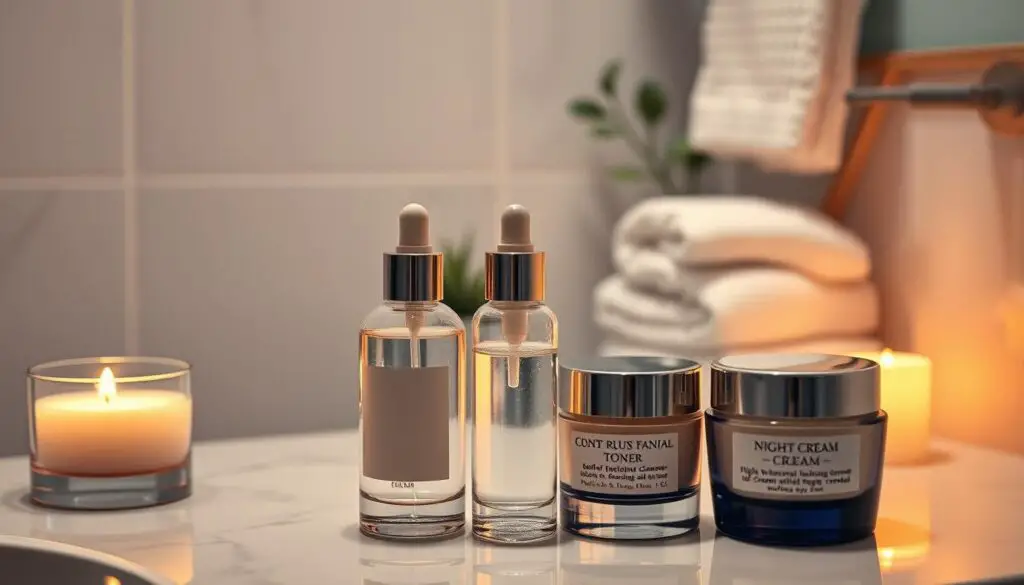
Why Nighttime Skincare Matters
At night, your skin works hard to heal and renew. Nighttime skincare tips for beginners help support these natural processes. They use targeted products and treatments.
- Skin cell regeneration peaks during sleep
- Increased blood flow supports healing
- Metabolism of skin cells accelerates
Key Products for Nighttime Care
Your evening skincare routine should include special products. These help your skin recover overnight:
- Gentle Cleanser: Remove daily impurities
- Treatment Serum: Target specific skin concerns
- Night Cream: Provide deep hydration
- Retinol Product: Promote cellular turnover
“Your skin does its most important work while you rest.” – Skincare Experts
Optimizing Sleep for Skin Health
Quality sleep boosts skin regeneration. Aim for 7-9 hours of uninterrupted rest. This supports your skin’s natural healing.
Create a calm sleep environment. Minimize screen time before bed. Keep a consistent sleep schedule.
By sticking to a consistent nighttime skincare routine, you’ll wake up with refreshed, glowing skin. This shows your dedication to self-care.
Additional Treatments for Specific Concerns
Adding to your simple skincare routine doesn’t have to be hard. You can tackle specific skin issues with targeted treatments. This keeps your skincare simple and effective.
Serums: Your Targeted Skin Solution
Serums pack a punch with their concentrated ingredients. They’re like precision tools for your skin. They target specific problems with strong formulas.
- Look for serums with hyaluronic acid for hydration
- Choose vitamin C serums for brightening
- Select niacinamide for reducing redness
Spot Treatments for Breakouts
When breakouts happen, you need a focused fix. Spot treatments can tackle acne without messing up your routine.
| Ingredient | Benefit |
|---|---|
| Salicylic Acid | Unclogs pores |
| Benzoyl Peroxide | Kills acne-causing bacteria |
| Tea Tree Oil | Natural antibacterial properties |
Antioxidants: Your Anti-Aging Allies
Keeping your skin safe from the environment is key. Antioxidants act as a shield against aging. They help keep your skin looking young.
“Prevention is always better than cure in skincare.” – Dermatology Experts
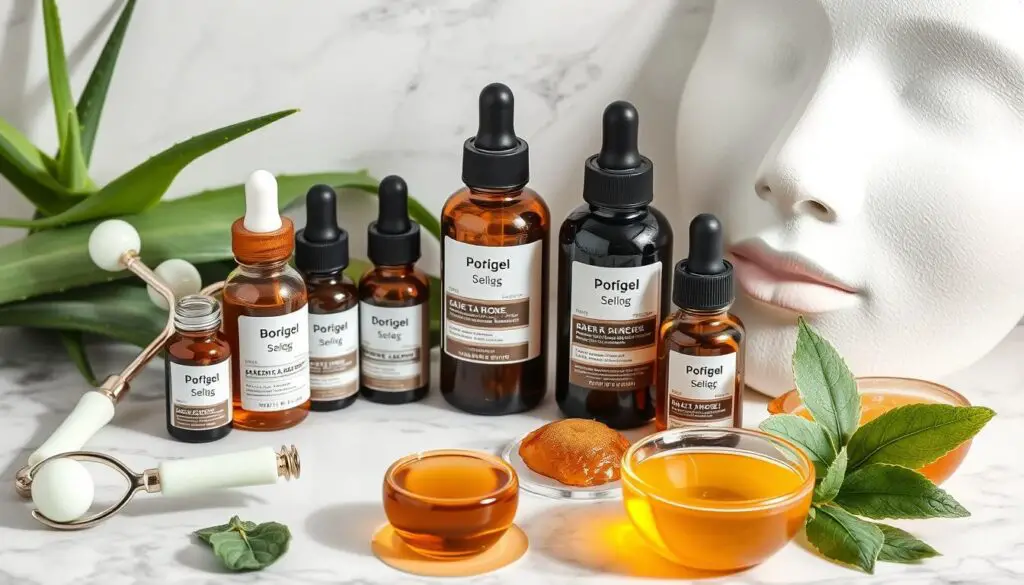
Start with one new product at a time. See how your skin reacts. Taking care of your skin is a journey, not a quick fix.
Recognizing Skin Problems
Starting your skincare journey can be tough. It’s key to know about common skin issues. This helps keep your skin healthy and tells you when to see a pro.
Many people face skin problems. Over 650 million worldwide deal with acne. Knowing about these issues is vital for beginners.
Common Skin Concerns You Should Know
- Acne: Affects multiple body areas including face, chest, and back
- Rashes: Can indicate various underlying health conditions
- Dryness and sensitivity: Often related to environmental factors
- Uneven skin tone: May signal hormonal changes
When Professional Help Becomes Necessary
Some skin issues need more than home care. See a dermatologist if you have:
- Persistent acne not responding to over-the-counter treatments
- Sudden appearance of rashes with fever
- Unusual skin discoloration or growths
- Chronic skin inflammation
Maintaining Long-Term Skin Health
Good skin care is more than treating problems. Create a routine that prevents issues before they start.
“Prevention is always better than cure when it comes to skincare.” – Dermatology Experts
| Skin Condition | Prevalence | Treatment Approach |
|---|---|---|
| Acne | 650 million globally | Topical treatments, consistent skincare |
| Eczema | Affects 2% population | Moisturizers, avoiding triggers |
| Rosacea | 10% of population | Prescription medications, lifestyle modifications |
Remember, your skin tells a story. Listen to it, care for it, and seek professional guidance when needed.
Establishing a Routine You Can Stick To
Creating a quick skincare guide for beginners means finding a skincare routine that fits your life. It’s all about being consistent to see real changes in your skin.
Building a skincare routine that lasts doesn’t have to be hard. Dermatologists suggest a simple six-step plan. This can easily fit into your daily routine.
Creating Your Daily Skincare Ritual
- Morning routine (5-10 minutes):
- Gentle cleansing
- Toning
- Lightweight moisturizer
- Sunscreen application
- Evening routine (10-15 minutes):
- Makeup removal
- Deep cleansing
- Serum application
- Night cream or moisturizer
Weekend Skincare Boost
Weekends are great for extra skincare care. Try adding:
- Exfoliation (1-2 times weekly)
- Face mask treatment
- In-depth hydration session
Tracking Your Skin’s Progress
Patience is crucial in skincare. It’s important to track your progress. Try:
- Weekly progress photos
- Skincare journal documenting product use
- Monthly skin assessment
“Consistency beats perfection in skincare” – Dermatology Research Institute
Remember, 85% of dermatologists say daily cleansing is key for healthy skin. Sticking to a routine will show results over time.
Adjusting Your Routine Seasonally
Your skincare routine needs to change with the seasons. As the weather changes, so do your skin’s needs. This means making smart changes to keep your skin healthy and looking good.
How Skin Changes with the Seasons
Skin goes through big changes all year. In winter, cold air takes away moisture, making skin dry. About 70% of people change their skincare routine with the seasons to handle these changes.
- Winter makes skin more sensitive
- Cold weather lowers oil production
- Less humidity means drier skin
Adapting Products for Different Weather
Beginner Skincare Routine: Beginners should switch products with the seasons. In winter, focus on hydration and protection. Dermatologists suggest:
- Use thicker, richer moisturizers
- Choose gentler cleansers
- Add hyaluronic acid serums
Transitioning Your Routine Throughout the Year
Understanding your skin’s needs is key to good skincare. About 80% of users see better skin texture by changing routines with the seasons.
“Your skin is dynamic – treat it accordingly” – Skincare Experts
Use a humidifier, take shorter, cooler showers, and stay hydrated. A well-adjusted skincare routine leads to radiant skin all year.
Budget-Friendly Skincare Options
Beginner Skincare Routine: Starting a simple skincare routine doesn’t have to cost a lot. You can find a good basic skincare regimen without spending too much. By choosing wisely and smart shopping, you can keep your skin healthy and your wallet happy.
Affordable Products That Work
Many top skincare products are priced right. Here are some affordable choices:
- CeraVe Moisturizer: $18 for face and body care
- Differin Adapalene Gel: $13 for a strong retinoid
- Paula’s Choice Chemical Exfoliator: $14 for older skin
- EltaMD Clear Face Sunscreen: $45 for safe sun protection
DIY Skincare Remedies
Beginner Skincare Routine:Make your own skincare with things you have at home. Natural ingredients can be great for your skin.
“Effective skincare doesn’t always need expensive products. Sometimes, the best things are in your kitchen.”
Prioritizing Your Skincare Budget
| Product Category | Recommended Budget | Priority Level |
|---|---|---|
| Cleanser | $10-$20 | High |
| Moisturizer | $15-$30 | High |
| Sunscreen | $20-$45 | Critical |
| Serums/Treatments | $25-$50 | Medium |
When starting your skincare, focus on key products with good ingredients. Choose items that do more for less. Remember, being consistent is more important than how much you spend.
Final Tips for Skincare Success
Beginner Skincare Routine: Starting your skincare journey can seem daunting. But, with the right steps, you’ll get the hang of it. Studies show that 70% of people see big improvements in their skin by sticking to a routine. Remember, everyone’s journey is different, and patience is crucial for the best results.
A simple skincare routine is all about building good habits. Many people feel lost with so many products out there. That’s why 55% stick to the basics. Choose products that fit your skin’s needs and try DIY face masks to save money and tailor your care.
Being consistent is key to healthy skin. More than 80% of people who stick to a routine feel better about themselves. Begin with the basics: clean, moisturize, and protect. Don’t worry about small setbacks—real change takes time, and your dedication will pay off.
Keep up with skincare trends, but be smart about it. Not every new thing is right for you. Pay attention to how your skin reacts and adjust your routine as needed. The best skincare is the one you can keep up with every day.
